Google search algorithms value links from high-authority websites as a trust factor, which makes link building a crucial part of every marketer’s SEO strategy.
But not all backlinks are created equal. While some marketers resort to quick and unethical ways of building links, we don’t recommend that.
Using white hat link building is the only sustainable way of building a high-quality link profile for your website. These links help you achieve higher SERP rankings and greater search visibility, not spammy links.
So, what is white hat link building? And, which techniques fall under this category? Keep reading to find out.
Table of Contents
ToggleWhat is white hat link building?
White hat link building refers to the practice of using ethical ways of building backlinks to a website. These are the tactics that follow Google’s webmaster guidelines and do not incur any penalties from the search engine.
Building links organically through blogger outreach, digital PR, and guest posting, falls under this category.
What is black hat link building?
On the other side of the spectrum is black hat link building. This involves using quick or spammy link building tactics that are considered unethical. Such tactics do not follow Google’s webmaster guidelines and, if caught, your website can incur penalties.
Buying links and using link farms or other types of link schemes fall under this category. You must avoid building links from such sources.
White hat vs. black hat link building: Which one should you use?
While 65% of marketers vouch for the role of link building on a website’s SEO performance, not all backlinks are helpful.
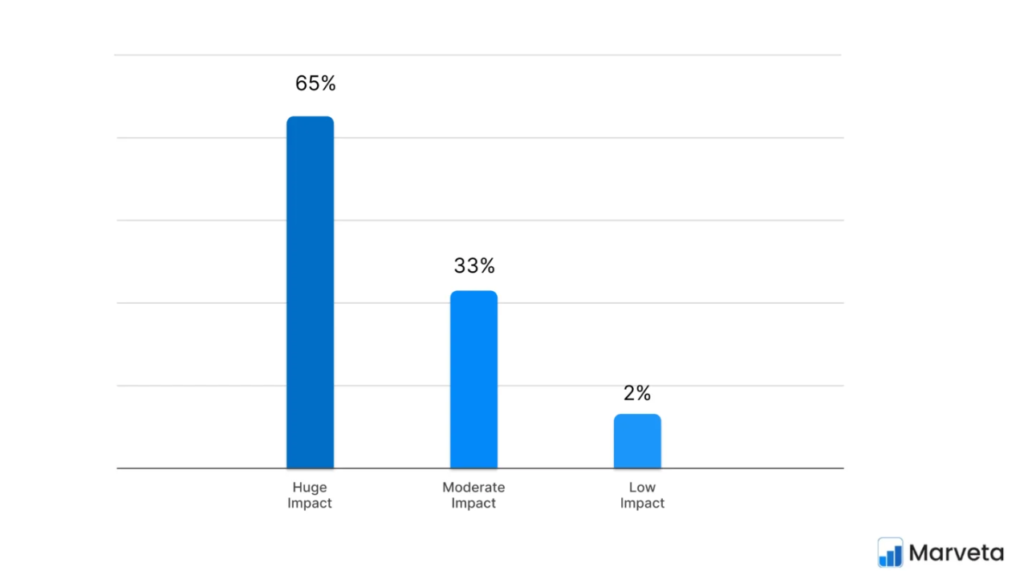
In fact, some links can do more harm than good to your site. These include links built using black hat tactics, which can drive quick results but are highly risky.
Google’s algorithm is good at identifying any unethical link building tactics that aim to manipulate the search engine rankings. If it catches such schemes, it can penalize the website and may even block it from SERP completely.
And even if you rectify your mistake and recover from the penalty, your site’s reputation suffers losses. That’s why you should only use white hat link building techniques. They are the safer and more sustainable way to move up in the SERPs.
6 White hat link building strategies that actually work
Here are six of the most effective tactics you should use to build backlinks ethically and organically:
1. Create linkable assets
Linkable assets are valuable pieces of content or resources that attract links naturally. Such assets help you earn backlinks rather than building them.
Some types of content are just better at attracting links than others. Some examples include:
- Original research reports
- Infographics on trending topics
- Free tools relevant to your audience
- Ebooks and in-depth how-to guides
- Calculators of any sort
- Downloadable templates and checklists
While it’s great to organically earn backlinks, you can do more by actively promoting your linkable assets. One of the most effective content types for this is an infographic.
Here’s how you can use infographic link building:
- Create a well-designed, research-backed infographic on a trending industry topic or a high-search volume keyword.
- Publish the infographic on your website and provide a link for anyone who wants to share the infographic on their website. Here’s an example of a website that has offered a simple way of sharing its infographic.
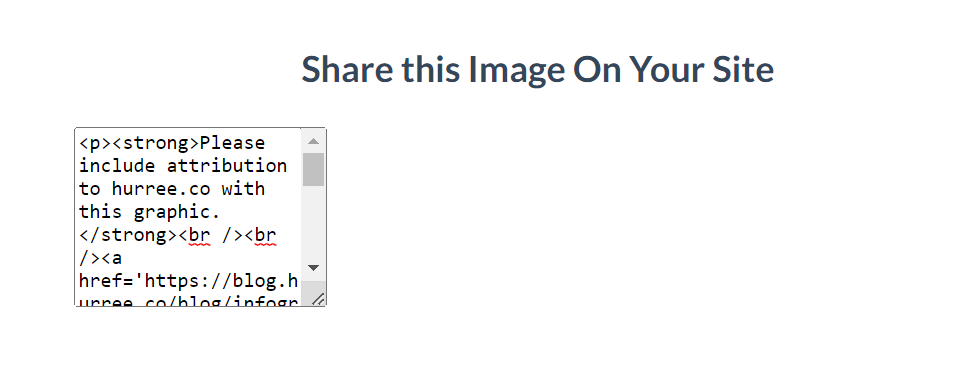
- Additionally, you should also reach out to editors of authoritative websites in your niche that would benefit from sharing that infographic with their audience.
- Allow the interested ones to republish the infographic on their websites in exchange for 1-2 backlinks to your website or the original infographic.
2. Write guest posts for authoritative websites
Guest posting is an evergreen white hat link building strategy that is still as effective as it was a decade ago. It is a proven tactic to build high-quality links from websites with a high domain rating.
Here’s how it works:
- Find authoritative websites in your niche that accept guest posts.
- Reach out to them with appropriate pitches for guest posting on their sites.
- Create high-quality content that meets each target site’s specific guidelines.
- Post articles on multiple sites and add backlinks to related content on your site.
Voila! You now have multiple sources that will keep directing traffic to your website, as long as your content is relevant and useful.
See how Mark Murphy, the CEO of Leadership IQ, has shared an article on Forbes and added a relevant backlink to their website.
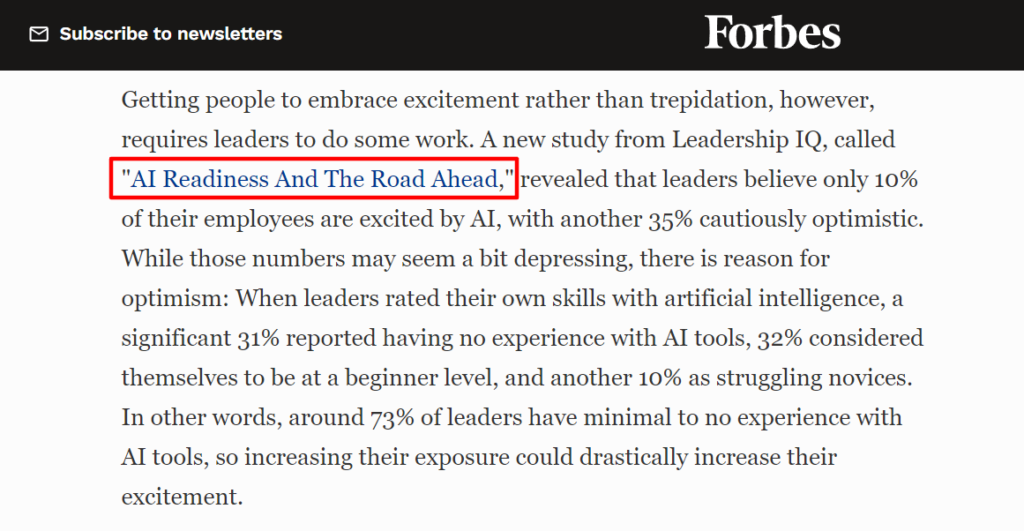
Leverage expert guest posting services to establish your niche authority and build high-quality backlinks.
3. Reclaim lost links to your website
Did you know that almost all websites lose links over time?
Two primary reasons for this are:
- The site editor removed your link from their website
- The web page on which the link was placed does not exist anymore
While these are the most common causes of lost links, there can be other reasons too.
So, what can you do to reclaim these links?
First, you need to find out the reason behind the lost link. If, for example, a link was lost simply because the content was updated, you can reclaim it.
You can use Ahrefs’ “lost backlinks” report to find links that were removed.

Then, you can reach out to editors and suggest appropriate places where your link would be useful.
4. Use the skyscraper technique and reach out to editors for link building
You would have heard this a lot in the context of link building:
“If you want to build backlinks from a website, you can simply ask.”
And yes, it works!
If you ask editors to add backlinks to a relevant resource on your website, some will say yes.
But how can you improve your chances of success?
Well, that’s where the skyscraper technique comes into the picture. It involves finding top-ranking content on a topic and creating something much better than it. Once you do that, you can confidently ask the sites linking to the original content to link to yours as well.
Here’s an illustration by Ahrefs that explains the technique:
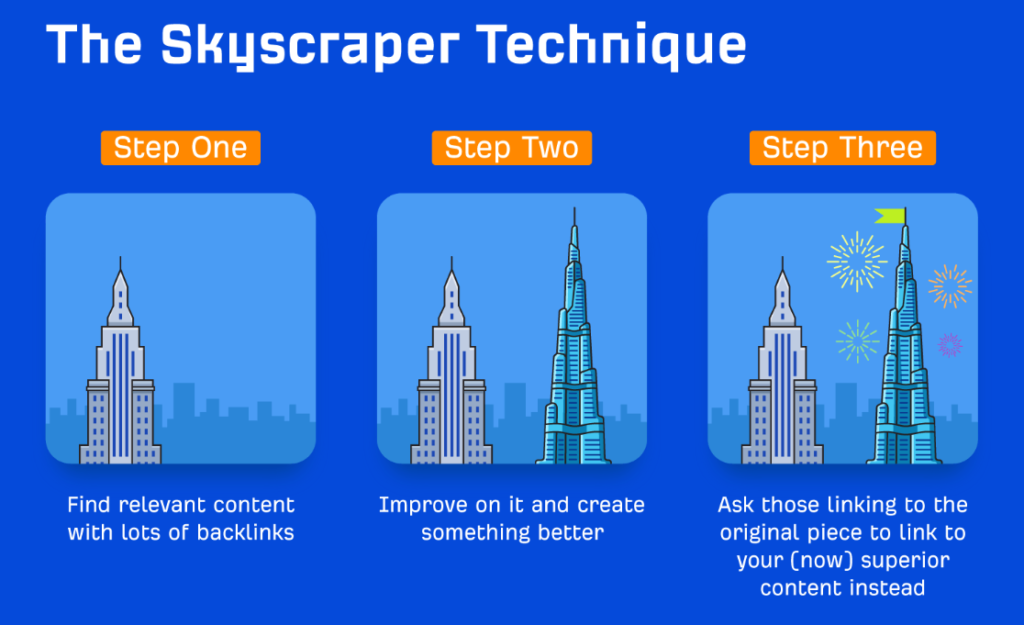
Partner with a reputable content marketing agency to create valuable content that naturally attracts backlinks and citiations.
5. Answer questions relevant to your niche on online forums
One of the most popular white hat link building techniques for building backlinks quickly is answering questions on various forums. Some of the most popular ones include Quora, Reddit, and relevant Slack communities.
People come to such forums to seek answers to questions on specific topics and expect answers from industry experts.
You can sign up on such platforms and answer comments related to your field. Within your answers, don’t forget to link to relevant resources on your website where users can find more detailed information on the topics.
Here’s an example from Quora: Thomas, who’s an expert in SaaS marketing, answered a question by giving an excerpt from and linking to their article on the topic.
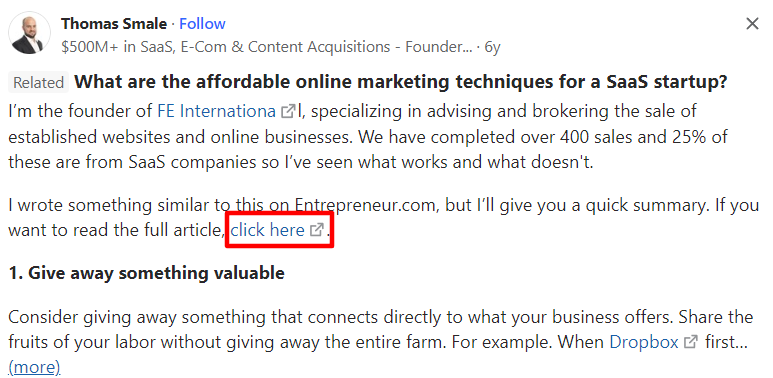
6. Invest in digital PR and building industry relationships
One of the most sustainable ways of building backlinks to your website is to build relationships with others in your industry.
You can add links to relevant sites and simply ask them to give you some links back if they find your content useful. This is not the same as buying links, just a friendly link exchange. And it’s not necessary that everyone will give you a link, as you’ll simply make a request, not a two-way exchange.
You can also reach out to bloggers and journalists and ask them to share a story about your company. Maybe you launched a new product or something newsworthy happened at your company. Get relevant news publications to cover the story and add a link to your website.
Invest in effective digital PR services to earn mentions and links.
Final thoughts
Link building is an ongoing process and there are no shortcuts when it comes to building high-quality backlinks. Using link schemes or other shady tactics will do more harm than good for your website.
That’s why white hat link building should be your only approach to building backlinks. Use this guide to understand what it entails and which tactics are safe to use.
And if you need help, you can always hire professional white hat link building services to get excellent results.








